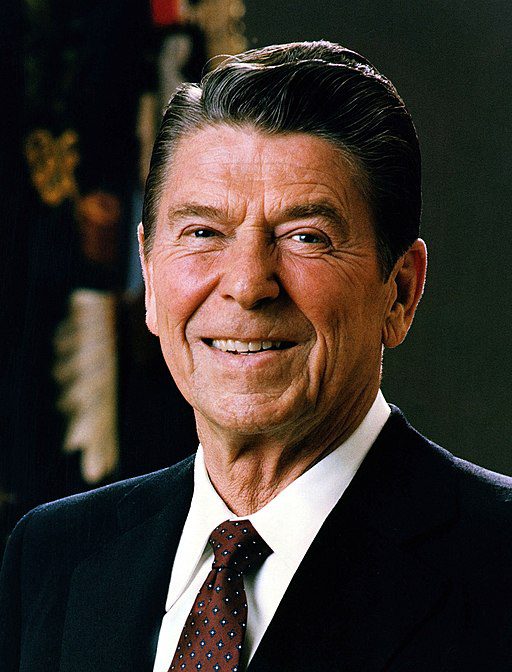Last week we blogged about the difference between old-style liberals and new-style progressives in the Democratic Party. There is also a difference between old-style conservatives and new-style conservatives in the Republican Party.
And while old-style liberals can be found among Democrats, they are mostly united around the progressive agenda. Republicans, though, have no such unity, which threatens their ability to govern.
Gerald F. Seib writes about this in the Wall Street Journal in Can the GOP Become a Real Working-Class Party? (behind a paywall). This is the explanatory deck: “Some Republicans want the party to break from its longtime free-market agenda and focus instead on the needs and frustrations of workers. Others see danger in moving away from the legacy of Reagan.”
Seib describes “a Republican party coping with an identity problem, if not a crisis”: “Is today’s Republican party conservative or populist? Is its patron saint Ronald Reagan or Donald Trump? Is it more intent on slashing government spending or preserving entitlement programs?”
He notes an op-ed piece in the Washington Post by Senator Josh Hawley (R-MO) entitled The GOP is dead. A new GOP must listen to working people. He argues that the Republicans underperformed in the midterm elections because they have not gone far enough in becoming the party of the working class. He calls for a new Republican Party that will abandon its traditional pro-business, balanced budget, small government policies in favor of a more regulated economy and government programs to help workers. Seib notes that Hawley is not alone in his vision for a new Republican party:
Sen. Hawley is at the forefront of a coterie of younger Republicans, in Congress and think tanks, who advocate policies that would mark a sharp break from the conservative, free-market gospel that has been the backbone of the GOP for more than half a century. They argue for abandoning free trade in favor of a network of tariffs to protect American goods and jobs, swearing off cuts to entitlement programs on which the working class rely, breaking up big tech firms, clamping down harder on immigration and finding common ground with union workers.
Hawley supports the cultural conservatism that characterizes many working-class folks and that drew them to Donald Trump. Other Republicans, though, identify with the free market philosophy of Ronald Reagan.
This is not a matter of RINOs, “Republicans in name only,” an epithet tossed around by Trump-style populists like Hawley. That label applies more to the mostly-extinct Rockefeller Republicans, with its old money elitism and moderate politics. Ronald Reagan was no RINO. The debate has to do with what Republicans are supposed to stand for.
This division in political philosophy matters. Right now, the narrow Republican majority in the House is holding up passage of the perennial bill to waive the limit on the national debt. I don’t know why we have a limit to the national debt if we are going to waive it every year. Some Republicans of the old school want to use the opportunity to cut government spending. New school Republicans are not that bothered with government spending and worry about cuts that would impact ordinary Americans. So what should Republicans do? They can’t get their act together to do much of anything. And that threatens their ability to win elections.
But I want to address some bigger issues. Democrats consider themselves to be the party of the working class. Ironically, though, they are now dominated by affluent, college-educated white collar professionals and corporate executives, who make up the major constituency for woke progressivism. But they are still pro-union and pro-government programs for lower income folks.
Republicans used to be the party of the business class. And yet now they are dominated by blue collar workers who are Donald Trump’s base.
So here is the dilemma. If Hawley and the new right have their way and Republicans become a thorough-going working class party, notice what we will have: Both parties want to be the voice of the working class. Both parties want government programs and economic policies to help them.
Won’t business interests be allowed to have a political voice? Will advocates of free enterprise economics not have a party anymore? If both parties represent the proletariat, what will happen to the bourgeoisie? That sounds like the political order of communism! Of course, an emphasis on the working class, as well as reducing politics and economics to class struggle, comes from Marxism, which I thought had been discredited.
The fact is, this schism is based on false dichotomies and confusions. Free enterprise economics ultimately helps everyone, including lower-income workers, by making products cheaper and better, and by making possible social mobility.
Free market economics is not the same as favoring big business. There has always been an alliance of big corporations with big government. Big corporations don’t like the free market either. They don’t like competition and prefer to corner the market so they can set their own prices. They don’t care for small business, which can threaten their dominance, so they are fine with taxes that only they can afford to pay and regulations that only they can afford to follow. Plus, they employ lots of women, so they support abortion and anti-family policies so as to keep them on the job. The corporate executives are all products of America’s universities, so the woke ideology is second nature to them. That the big corporations now favor progressive Democrats only seems like an anomaly. It is actually quite natural.
It was Reagan who started Republican populism, not Trump. He was the one who gave us “Reagan Democrats”; that is, blue collar types who used to be Democrats shifting to the Republican cause, largely because they were conservative culturally.
Reagan was the one who forged the alliance between economic libertarians and cultural conservatives. But today that alliance needs some work.
Here is a modest proposal for both factions: Old-school conservatives should learn from the populists to stand for ordinary Americans, not just the wealthy, as pre-Reagan Republicans became known for. Be for small business, leaving big business for the Democrats.
Old-school conservatives should also learn from the populists to avoid war. Having a strong national defense can help with that, but unnecessary wars are always a bad idea. And we need to be very, very careful about our involvement in Ukraine, lest we trigger what we avoided throughout the Cold War, a nuclear exchange with Russia.
Populists should learn from the old-school conservatives that government programs are probably not the answer to their problems. And that we have to do something to slash government spending and the federal deficit. Otherwise, we face economic catastrophe.
And both sides can come together on what they already agree on: freedom, the Bill of Rights, constitutional government, and pro-family values.
Photo: President Ronald Reagan, White House Photographic Office, Public domain, via Wikimedia Commons











